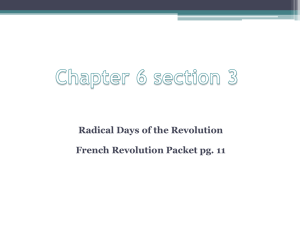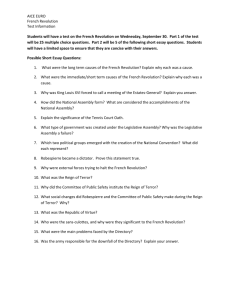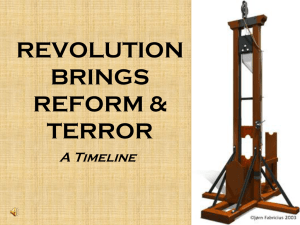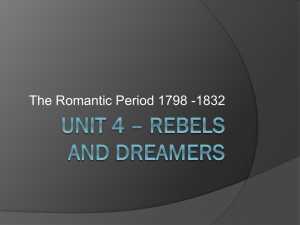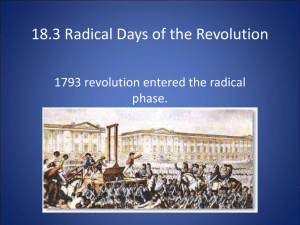World History - Sarasota Military Academy
advertisement
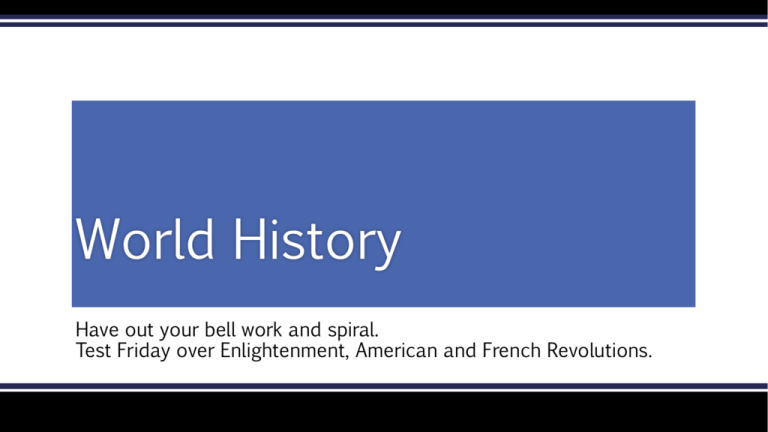
World History Have out your bell work and spiral. Test Friday over Enlightenment, American and French Revolutions. Bell Work Week 14: Thursday 04.23.15 ▪ Respond to the following in complete sentences in the space for Thursday on your bell work paper. What do you think is the difference between a revolt and revolution? What is the key difference between them? Table of Contents Unit 9: Enlightenment and Revolution Reading Notes 18.2 Notes Reading Summary 18.3 Unit 8: Age of Absolutism Pop-up notes Absolute Monarchs Reading Summary 16.1 Reading Summary 16.2 Chart of Monarchies Reading Summary 16.3 English Civil War Unit 9: Enlightenment and Revolution Chart of Enlightened Thinkers Reading Summary 17.2 Definitions Summary 17.3 Timeline Notes Reading Summary 18.1 Notes: French Revolution Essential Question How did enlightened thinkers inspire revolutionaries to push for radical changes in government and society in France? Topical Questions ▪SS. 912.W.5.6 ▪What were the important causes, events and effects of the French Revolution? Who were some of the important people involved in the French Revolution? Reading ▪ Read the section 18.2 titled: “The French Revolution Unfolds” pp. 392-396 in your textbook. ▪ As you read make notes on WHO, WHAT, WHEN, WHERE, and WHY of the French Revolution. Reading Notes pp. 392-397. ▪ Who? ▪ What? ▪ When? ▪ Where? ▪ Why? Radical Period of the French Revolution Tension Mount Mounting tension leads to more violence…. In 1792, the war abroad was going badly for the French. • Many revolutionaries believed that the king was in league with foreign powers to retain his power. • Citizens attacked the palace where the king was held. The king and his family escaped to the Legislative Assembly. • Citizens also attacked prisons that held nobles and priests. Tensions led to increasing violence. Violence Escalates Radicals took control of the Legislative Assembly and called for the election of a new legislative body—the National Convention. National Convention • Extended suffrage to all male citizens. • Seized nobles’ lands. In addition, the monarchy was abolished in favor of the creation of a republic. The National Convention put Louis XVI on trial as a traitor to France. He was sentenced to death. • In January 1793, Louis XVI was beheaded. • In October 1793, Marie Antoinette was beheaded. By 1793, France faced external and internal threats. • War continued with the Netherlands, Spain, Britain, and Prussia. • Royalists and priests led rebellions against the government. • The sans-culottes demanded relief from food shortages and inflation. The Convention created the Committee of Public Safety to deal with these issues. The National Convention granted the Committee of Public Safety absolute power to save the revolution. At war, French armies overran the Netherlands and invaded Italy. At home, France battled counterrevolutionaries through the use of terror. Maximilien Robespierre became the leader of the Committee of Public Safety. Robespierre: He was a reformer, but also supported terror as a way to maintain order. • Arrested and tried all those who threatened the revolution Nearly 300,000 people were arrested and 17,000 executed by guillotine for opposing the revolution. The Reign of Terror continued until Robespierre himself was executed in 1794. Reaction to Reign of Terror Move to more moderate ideas In reaction to the Reign of Terror, moderates produced the Constitution of 1795. ▪The Constitution created a five-man Directory and a two-house legislature. The Directory: • Made peace with Prussia and Spain • Continued the war with Austria and Great Britain • Created a constitutional monarchy France Was Changed The old social order was gone. The monarchy was gone. The Church was under state control. Independent Practice ▪ Read and answer the questions on the side and at the bottom of Summary 18.3 ▪ Complete the following questions on a separate sheet of paper as a review for your test. ▪ Textbook p. 382 #1-11, p. 418 #1-14 ▪ TEST TOMORROW!!!
